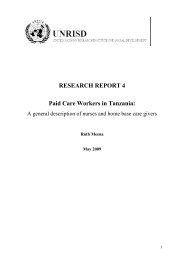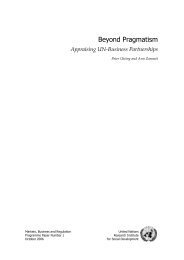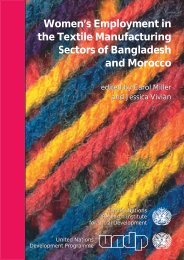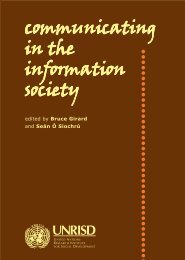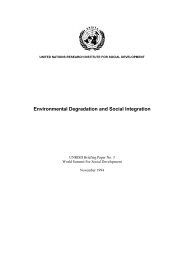The Politics of Gender and Reconstruction in Afghanistan
The Politics of Gender and Reconstruction in Afghanistan
The Politics of Gender and Reconstruction in Afghanistan
Create successful ePaper yourself
Turn your PDF publications into a flip-book with our unique Google optimized e-Paper software.
INTRODUCTION<br />
I.<br />
<strong>in</strong>troduction<br />
Preoccupations with issues <strong>of</strong> gender justice <strong>and</strong> equity are<br />
seldom at the forefront <strong>of</strong> <strong>in</strong>ternational concerns <strong>in</strong> war<br />
<strong>and</strong> conflict situations. Indeed, a recent UNDP report<br />
(2003) notes the marg<strong>in</strong>alization <strong>of</strong> gender dimensions<br />
<strong>in</strong> conflicts <strong>and</strong> crises <strong>and</strong> a general failure to address<br />
women’s vulnerabilities <strong>and</strong> concerns. <strong>Afghanistan</strong> would, on the face <strong>of</strong> it, appear to constitute an exception to<br />
this rule if we are to go by the centrality accorded by the <strong>in</strong>ternational community to women’s oppression<br />
under the Taliban. <strong>The</strong> plight <strong>of</strong> women <strong>in</strong> <strong>Afghanistan</strong> was <strong>in</strong>voked, among other concerns, as a humanitarian<br />
crisis justify<strong>in</strong>g military <strong>in</strong>tervention <strong>in</strong> the aftermath <strong>of</strong> the 11 September 2001 attacks <strong>in</strong> the United States. 1<br />
Revers<strong>in</strong>g abuses <strong>of</strong> women’s rights became an explicit policy goal, at least at the level <strong>of</strong> rhetoric.<br />
However, debates among transnational fem<strong>in</strong>ist constituencies on an appropriate politics <strong>of</strong> solidarity with<br />
women <strong>in</strong> <strong>Afghanistan</strong> proved to be quite divisive. <strong>The</strong>se exchanges followed the familiar tropes <strong>of</strong> women’s<br />
rights as universal human rights versus “fem<strong>in</strong>ism-as-imperialism”, reflected <strong>in</strong> a spate <strong>of</strong> articles <strong>in</strong> both the popular<br />
press <strong>and</strong> academic journals (with evocative titles such as “Fem<strong>in</strong>ism as imperialism”, “Do Muslim women<br />
really need sav<strong>in</strong>g?” <strong>and</strong> “Imperial wars or benevolent <strong>in</strong>terventions?”). 2 Abu-Lughod highlighted a cont<strong>in</strong>uity<br />
<strong>in</strong> colonial meddl<strong>in</strong>g, warn<strong>in</strong>g that “we need to be wary when Lord Cromer <strong>in</strong> British-ruled Egypt, French<br />
ladies <strong>in</strong> Algeria <strong>and</strong> Laura Bush, all with military troops beh<strong>in</strong>d them, claim to be sav<strong>in</strong>g or liberat<strong>in</strong>g Muslim<br />
women” (2002:3). She also suggested that we need to accept the possibility that different women may have<br />
different conceptions <strong>of</strong> what constitutes justice or the good life, <strong>and</strong> that some may seek a fem<strong>in</strong>ist voice with<strong>in</strong><br />
Islam. Arat-Koc (2002) drew attention to the use <strong>of</strong> references to culture <strong>and</strong> religion as the cause <strong>of</strong> women’s<br />
oppression; such references could serve both to justify a “humanitarian” war <strong>and</strong> to disown the limitations <strong>of</strong> war<br />
<strong>in</strong> effect<strong>in</strong>g real change by <strong>in</strong>vok<strong>in</strong>g the work<strong>in</strong>gs <strong>of</strong> local culture. Moghadam (2002), while equally critical <strong>of</strong><br />
the hypocrisy <strong>in</strong>herent <strong>in</strong> the discovery <strong>of</strong> Afghan women’s plight only after the Taliban takeover <strong>of</strong> Kabul <strong>in</strong><br />
1996, was scath<strong>in</strong>g <strong>in</strong> her condemnation <strong>of</strong> a cultural relativism that sanctions <strong>and</strong> condones all manner <strong>of</strong> patriarchal<br />
excesses <strong>in</strong> the name <strong>of</strong> culture, but proscribes the progressive policies <strong>of</strong> the Democratic Republic <strong>of</strong><br />
<strong>Afghanistan</strong> (DRA) as somehow <strong>in</strong>appropriate to a Muslim society.<br />
Charges <strong>of</strong> patroniz<strong>in</strong>g attitudes towards the women <strong>of</strong> <strong>Afghanistan</strong>, voiced by various authors, clearly orig<strong>in</strong>ate<br />
from different types <strong>of</strong> concerns. For some, trivializ<strong>in</strong>g the worldviews <strong>of</strong> women whose underst<strong>and</strong><strong>in</strong>gs <strong>of</strong><br />
women’s rights do not fit neatly <strong>in</strong>to categories that place fem<strong>in</strong>ism on the side <strong>of</strong> the West constitutes a major<br />
shortcom<strong>in</strong>g. For others, delegitimiz<strong>in</strong>g the political choices <strong>and</strong> militancy <strong>of</strong> Afghan women who opted for<br />
“progressive” policies represents a form <strong>of</strong> political collusion that uses the notion <strong>of</strong> difference as a means <strong>of</strong><br />
obfuscation.<br />
Whatever the merits <strong>of</strong> these arguments <strong>and</strong> the undoubtedly significant role <strong>of</strong> <strong>in</strong>ternational fem<strong>in</strong>ist platforms<br />
<strong>in</strong> lobby<strong>in</strong>g for women’s rights <strong>in</strong> <strong>Afghanistan</strong>, 3 it is at the national level—<strong>in</strong> prospects for security <strong>and</strong> national<br />
consolidation <strong>and</strong> <strong>in</strong> struggles over constitutional <strong>and</strong> citizenship rights—that the most decisive outcomes are<br />
set to materialize. Molyneux <strong>and</strong> Razavi state quite unambiguously that “the central <strong>in</strong>strument for the protection<br />
1 One year after the US <strong>in</strong>tervention <strong>in</strong> <strong>Afghanistan</strong>, a newspaper columnist expressed this graphically by stat<strong>in</strong>g that: “<strong>The</strong> burqa was the battle flag <strong>of</strong><br />
last year’s brief war” (Toynbee 2002:2–3).<br />
2 V<strong>in</strong>er 2002; Abu-Lughod 2002; Arat-Koc 2002.<br />
3 For <strong>in</strong>stance, Fem<strong>in</strong>ist Majority’s “Campaign to stop gender apartheid <strong>in</strong> <strong>Afghanistan</strong>” scored some US political victories for Afghan women’s rights.<br />
Through a series <strong>of</strong> petitions <strong>and</strong> lobby<strong>in</strong>g activities, they played a significant role <strong>in</strong> 1998 <strong>in</strong> persuad<strong>in</strong>g the UN <strong>and</strong> the US to reject formal recognition<br />
<strong>of</strong> the Taliban. <strong>The</strong>y also put pressure on US energy company Unocal to back out <strong>of</strong> a $3 billion venture to put a pipel<strong>in</strong>e through <strong>Afghanistan</strong><br />
that would have given the Taliban $100 million royalties.<br />
PAGE 1




